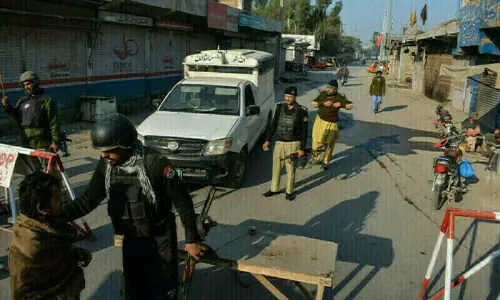A Pakistani blogger who went missing mysteriously earlier this year and returned home several weeks later has alleged that he was tortured while in detention, a BBC report said on Wednesday.
Asim Saeed was one of the five activists who disappeared in early January from different cities in Pakistan. The other four include academic Salman Haider, bloggers Waqas Goraya and Ahmed Raza Naseer, and Samar Abbas, head of an anti-extremism activist group in Karachi.
Saeed, who currently lives and works in Singapore, has now applied for asylum in Britain, fearing his life would be in danger if he had to return to Pakistan.
Prior to his disappearance, Saeed managed Mochi, a Facebook page which was known for carrying posts critical of the Pakistani military. "Since the inception of Pakistan, they've always been ruling us directly or indirectly," he said to BBC.
'Beaten with leather strap'
Sharing details of his disappearance with the BBC, Saeed said that he was visiting Pakistan for his brother's wedding when some men in plain clothes arrived at his residence and took him away in a car.
"'Do you know why you've been picked up?' they asked. I said, 'I have no idea'. Then he started to slap me. They said, 'Let's talk about Mochi'," Saeed said.
Saeed alleged he was asked to divulge passwords for his email accounts and mobile phone, and was later taken to a 'secret detention facility'. At the facility, he said, he was detained with men who he believed were "religious terrorists".
During the detention, Saeed said he was beaten with a leather strap, which left his arms and back in "shades of purple, blue and back".
"I don't remember what happened, I fell down and someone was holding my neck in his feet, and the other guy kept beating and beating and beating," he told the BBC.
Saeed, who believed he would be killed during the detention, said he was made to undergo polygraph tests at another detention facility and questioned about having any links with India's RAW.
He denied having any association with foreign intelligence agencies as well as posting material that could be deemed blasphemous.
Saeed said that he did not regret his activism, adding that "people have to stand up".
The abduction
Saeed and his cousin Waqas Goraya, an anthropologist, had gone missing in Lahore's Wapda Town on January 4. Goraya, too, had claimed in March while talking to BBC that he had been tortured during detention.
The disappearances of activists had triggered protests nationwide and on social media. No group had claimed responsibility for the abductions.
Human Rights Watch and other rights groups had said that near simultaneous disappearances of the activists raised concerns of government involvement, which officials and intelligence sources had denied at the time. A security source had denied intelligence services were involved in the disappearances.



































